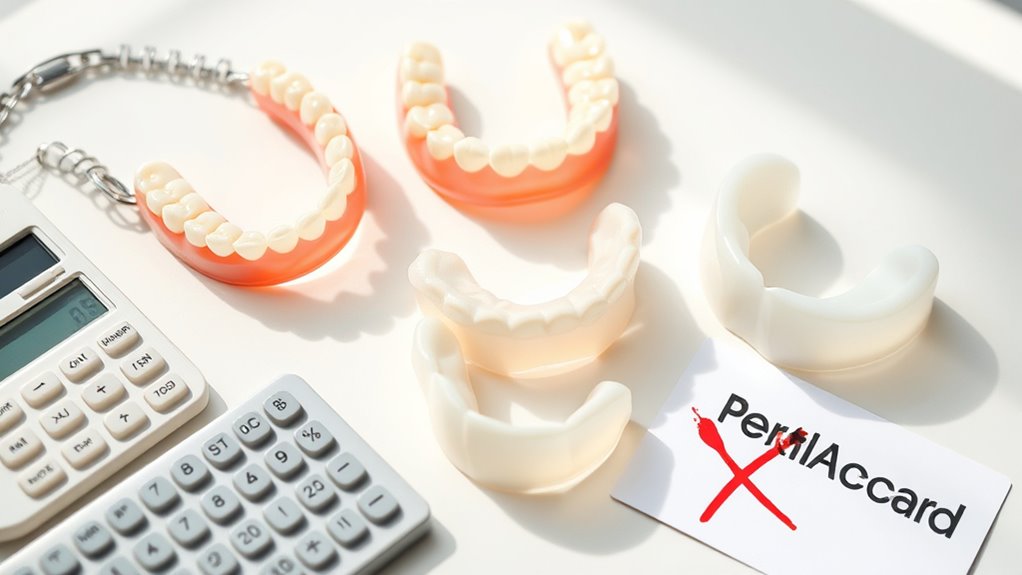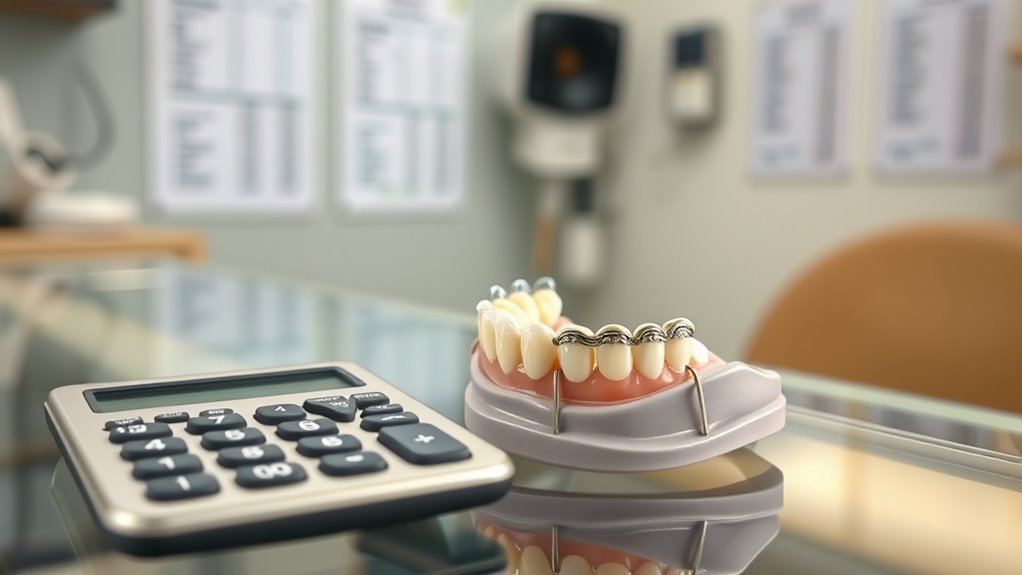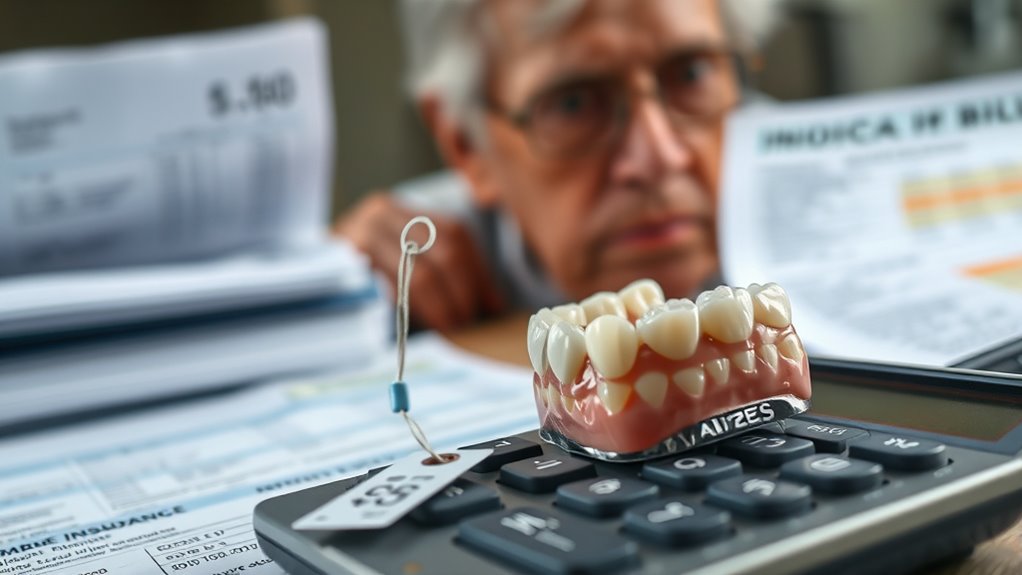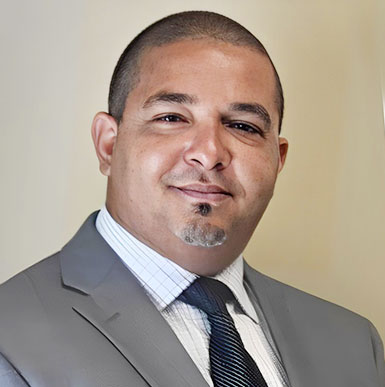Without insurance, partial dentures typically cost between $700-$2,500 per arch. You'll pay less for acrylic partials ($300-$1,500) and more for metal frameworks ($1,000-$4,200+) or flexible options like Valplast ($700-$2,500). Your location greatly impacts pricing, with urban areas charging 15-30% more than rural practices. Costs also vary based on material quality, dentist expertise, and case complexity. Additional factors to consider include maintenance expenses and potential financing alternatives that can make quality dentures more affordable.
Cost Breakdown of Different Partial Denture Types

While exploring your options for partial dentures, you'll find that costs vary considerably based on the type you select.
Acrylic vs. Metal frameworks represent the most substantial price difference in the market. Basic acrylic partials typically range from $300-$1,500 per arch, making them the most affordable option for temporary solutions.
Metal frameworks, primarily cast from cobalt-chrome or titanium, cost considerably more at $1,000-$4,200+, but offer superior durability with a 5-10 year lifespan. Metal partials average around $1,800 and are stronger than acrylics.
For those seeking comfort and aesthetics, flexible dentures like Valplast provide notable benefits at $700-$2,500 per arch, with an average cost of about $1,761 for partial flexible dentures.
The premium option—implant-supported partials—ranges from $3,000-$7,294 but delivers the most natural function.
Location, customization requirements, and material quality all influence these baseline prices. These prices can increase with additional procedures such as tooth extractions that may be required before denture fitting.
Average Price Ranges for Partial Dentures in 2023
Five key factors influenced partial denture pricing in 2023, with nationwide averages showing significant variation based on materials, complexity, and provider location. Without insurance coverage, you'll find most partial dentures ranged from $700-$2,500 per arch, though costs varied by type and quality. Dental schools often provide partial dentures at reduced prices for those seeking more affordable options. Most dentists recommend partial dentures to prevent further loss of natural teeth while providing functional replacement options. Payment flexibility through in-house plans is commonly offered by dental practices to help manage these expenses.
| Denture Type | Price Range | Longevity |
|---|---|---|
| Acrylic | $300-$1,400 | 5-8 years |
| Metal Framework | $1,000-$3,500 | 10-15 years |
| Flexible Resin | $900-$2,500 | 5-10 years |
Following proper denture maintenance tips like nightly soaking and avoiding abrasive cleaners extends your investment's lifespan. Regular oral hygiene practices also prevent further tooth loss that might require costly denture modifications.
Key Factors That Influence Partial Denture Pricing

Several critical factors determine what you'll pay for partial dentures when purchasing without insurance coverage.
Material composition notably impacts both cost and material durability—acrylic options ($300-$1,500) require frequent adjustments, while metal frameworks ($1,000-$3,500) offer superior longevity and patient satisfaction.
Case complexity also drives pricing; replacing 1-2 teeth costs $300-$1,500, while multi-tooth replacements exceed $2,500.
Your geographic location matters too, with urban areas charging 20-40% more than rural regions. Dental practices in different locations have significantly different operating expenses, affecting their pricing strategies.
Dentist expertise affects costs considerably—prosthodontists command 15-30% higher fees than general dentists. Some practices offer dental discount plans that can significantly reduce out-of-pocket expenses when purchasing without insurance.
Moreover, procedures like extractions ($75-$300 per tooth) and maintenance requirements (including $100-$300 annual adjustments) further influence your total investment, as do custom features like precision attachments ($150-$500).
Certain specialized options like Valplast flexible partial dentures offer excellent tissue adaptation for a comfortable fit, typically costing between $800 and $1,500.
Budget-Friendly Alternatives When Paying Out-of-Pocket
When facing the high costs of partial dentures without insurance, you'll find several budget-friendly alternatives to manage expenses effectively.
Dental school clinics offer supervised care at 30-60% below private practice rates, while payment plans through providers like CareCredit can split your costs into manageable monthly installments with 0% interest options.
Discount dental programs with annual membership fees of $100-$200 can secure you 10-60% savings on partial dentures across nationwide provider networks, including immediate coverage without waiting periods. Remember that your out-of-pocket expenses typically range from $500 to $2,500 depending on the materials and type of partial denture you choose.
Dental School Clinics
Dental school clinics provide one of the most cost-effective options for patients seeking partial dentures without insurance coverage.
You'll typically pay 25-50% less than private practices, with removable partials costing around $757 compared to $1,915+ elsewhere. These savings extend to initial exams ($76) and X-rays ($115).
Your treatment will be performed by dental students during their supervised learning experience, with faculty dentists overseeing every step and finalizing all adjustments.
While appointments run longer (2-3 hours) and the process takes 4-8 weeks due to academic schedules, the quality meets FDA standards.
Most schools prioritize thorough care cases and may have waitlists for non-urgent treatments.
With over 50 dental schools nationwide offering public clinics, pricing varies by region, ranging from $395-$2,930 per arch.
Payment Plan Options
For patients without insurance coverage, numerous payment plan options can greatly reduce the financial burden of partial dentures. Many practices offer in-house payment plans splitting costs over 6–24 months, typically requiring 10–30% down payments and no credit checks. These provide essential payment flexibility for immediate treatment needs.
Third-party financing programs like CareCredit offer 0% interest for 6–24 months on approved credit, while ONEderful Finance provides access to multiple lenders with terms up to 144 months. Some providers can help you finance up to $75,000 for extensive dental work including partial dentures.
Alternative financing through HSAs and FSAs allows you to use pre-tax funds, reducing expenses by 20–30%. For additional payment convenience, most dental offices accept major credit cards including Mastercard, Visa, American Express, and Discover.
For budget-conscious patients, direct-to-consumer options from dental labs offer partial dentures at 70% below clinic prices ($300–$450 versus $1,500–$3,500), often with satisfaction guarantees and free adjustments.
Discount Dental Programs
Four compelling alternatives to traditional insurance exist through discount dental programs, offering substantial savings for partial denture patients paying out-of-pocket.
These membership-based plans require annual fees rather than premiums, giving immediate access to discounted rates without claims paperwork or waiting periods. Many patients find these plans especially helpful since Medicaid is not accepted at Aspen Dental. Partial dentures normally cost between $300–$2,500 depending on the material and complexity.
- Immediate savings – Programs like American Dental Care and DentalPlans.com provide 30-85% discounts on partial dentures, with pre-negotiated rates paid directly to participating dentists.
- Affordable membership fees – Individual plans cost $7-$29 monthly, while family plans covering up to 8 dependents start around $29.
- Comprehensive coverage – Discount program benefits extend to procedures often excluded by insurance, with no annual maximums limiting your care. Members can enroll at any time throughout the year, unlike traditional insurance plans with specific enrollment periods.
Unlike insurance, these plans have no deductibles or copays, though provider networks may be smaller.
Regional Price Variations Across the United States
The cost of partial dentures without insurance varies greatly across different regions of the United States, with price differences of up to $1,200 between states like Hawaii and Oklahoma.
You'll find notable urban-rural pricing disparities, where metropolitan areas typically charge 15-30% more than rural practices for the same denture services.
Each state's economic conditions, cost of living, and local dental market competition directly impact what you'll pay out-of-pocket for partial dentures, creating a complex pricing environment that requires research specific to your location. The national average cost for partial resin dentures is approximately $1,738 without insurance coverage. Despite these cost variations, customers consistently report high satisfaction ratings with their partial dentures, particularly regarding comfort and fit quality.
Regional Price Variations Across the United States
Significant differences in partial denture costs exist across diverse regions of the United States, creating a complex pricing environment for patients seeking these dental prosthetics without insurance coverage.
Regional demand and cost implications vary dramatically from coastal to inland areas, with West Coast prices averaging 20-30% higher than central states. Metropolitan areas typically have higher pricing due to increased overhead costs and quality material options reflecting the premium denture categories outlined in pricing structures. Dental specialists' experience significantly impacts pricing tiers within each region, with more experienced prosthodontists commanding premium rates.
- Northeastern states like Massachusetts ($2,297) and New York ($2,158) maintain premium pricing that exceeds Southern states like Mississippi ($1,687) by approximately 35%.
- Material costs fluctuate regionally, with acrylic resin ranging from $300 in the South to $800 in the Northeast per arch.
- Geographic isolation drives prices higher in states like Hawaii ($2,867) and Alaska ($2,371) due to shipping costs and supply chain challenges.
Urban vs. Rural Pricing
Looking beyond general regional differences reveals a stark urban-rural divide in partial denture pricing across America.
Urban pricing typically runs 15-30% higher than rural alternatives due to increased operational costs and premium material availability. While city dwellers pay $1,700-$3,100 for flexible nylon dentures, rural patients access basic acrylic options for just $300-$800. The choice of denture material significantly impacts both initial costs and long-term value for patients regardless of location.
Despite having three times more dental practices per capita, urban markets maintain higher prices through specialization and branding.
Meanwhile, rural patients often travel 50-150 miles for specialized care, adding $100-$300 in transportation expenses.
Urban clinics offer advanced materials like titanium frameworks and CAD/CAM precision, which add $200-$500 to costs compared to manual fabrication methods common in rural practices.
State-by-State Cost Comparison
While insurance coverage dramatically impacts out-of-pocket expenses, geographic location remains one of the most significant factors determining partial denture costs across America.
State pricing patterns show considerable variation with northeastern and western coastal states typically charging premium rates compared to southern and midwestern regions.
- Highest Cost States – New York, California, and Massachusetts generally have partial denture fees 15-25% above the national average, with basic acrylic partials starting around $900-1,200.
- Mid-Range States – Illinois, Pennsylvania, and Florida offer more moderate pricing, averaging $700-950 for similar denture types.
- Budget-Friendly States – Tennessee, Kentucky, and Mississippi provide the most affordable options, with partial dentures often available for $500-750.
These regional differences reflect variations in operational costs, practitioner density, and local market competition.
Comparing Partial Dentures to Other Tooth Replacement Options
When considering tooth replacement options, you'll find that partial dentures represent just one of several solutions available to restore your smile.
At $300-$4,000 without insurance, partials offer a cost-effective alternative to dental implants ($3,000-$4,500 per tooth) and fixed bridges ($2,000-$5,000). Your choice of denture materials greatly impacts both price and durability.
While partials last 5-10 years, implants can function for 15-25+ years with a 95% success rate. Bridges typically last 10-15 years but require grinding down adjacent teeth.
Partials don't damage surrounding teeth but need daily removal and cleaning. Insurance coverage varies widely for each option, with many plans covering portions of partials but offering limited benefits for implants.
Hidden Costs and Long-Term Expenses to Consider

Beyond the initial purchase price of partial dentures, you'll encounter several hidden costs that can greatly impact your total investment over time.
When budgeting for your oral healthcare, factor in these maintenance costs and hidden fees:
- Extraction procedures – If you require tooth removal before denture fitting, these extra procedures typically range from $75-$300 per tooth.
- Ongoing adjustments and maintenance – Regular professional adjustments, relines, and repairs will be necessary throughout your denture's lifespan, costing between $50-$200 per visit.
- Replacement and care products – Budget for specialized cleaning supplies ($5-$30 monthly), including antibacterial mouthwash, denture brushes, soaking solutions, and cleaning tablets.
Moreover, partial dentures need replacement every 5-10 years.
Payment Plans and Financing Options for Uninsured Patients
Without dental insurance coverage, you'll need to investigate several financing pathways to make partial dentures affordable.
Dental school clinics offer 50-75% discounts through supervised student work, though wait times range from 2-8 weeks.
Discount dental plans provide immediate activation with annual fees of $100-$200 for 30-60% savings.
Activate savings immediately with discount dental plans—pay $100-$200 annually for 30-60% off denture costs.
For more payment flexibility, examine third-party financing through personal loans ($1,000-$100,000) with 6%-36% APRs or dental credit cards offering 0% interest for 6-24 months.
Many practices (65%) provide in-house payment plans with 6-24 month terms requiring 10-30% down payments.
As last-resort financing strategies, check government assistance programs—Medicaid covers partial dentures in 32 states, while nonprofits like Dental Lifeline serve seniors and disabled patients through 450+ federally qualified health centers.
Frequently Asked Questions
How Long Will Partial Dentures Last Before Needing Replacement?
Your partial dentures typically last 3-5 years for acrylic types and 5-15 years for metal frameworks.
Several durability factors affect this timeframe: material quality, daily wear patterns, and anatomical changes in your mouth.
You'll extend their lifespan by following maintenance tips like daily cleaning with soft brushes, overnight soaking, and scheduling annual dental check-ups.
Watch for replacement signs including visible cracks, persistent discomfort, difficulty chewing, or discoloration resistant to cleaning.
Can I Eat Normally With Partial Dentures?
You'll gradually return to normal eating habits with partial dentures after an initial adjustment period.
Start with soft foods for 1-2 weeks, taking small bites and chewing slowly.
Avoid hard foods (nuts, seeds), sticky items (caramel), and tough meats that can damage or dislodge your dentures.
Cut crunchy vegetables into smaller pieces.
With practice, these denture adjustments become second nature, but you'll always need to exercise caution with particularly challenging foods.
Will Partial Dentures Look Natural or Obviously Fake?
Modern partial dentures can look remarkably natural. Your denture materials greatly impact appearance—flexible nylon and high-quality porcelain teeth look most realistic.
Metal frameworks offer durability but may show clasps when smiling. For ideal natural appearance, choose custom-colored teeth and gum bases that match your existing teeth.
Premium options with precision attachments are virtually indistinguishable from natural teeth. Regular maintenance and proper fit also guarantee your partial dentures maintain their natural look over time.
Are There Tax Deductions Available for Partial Denture Expenses?
Yes, your partial denture expenses may be tax deductible if they're medically necessary rather than cosmetic.
To qualify, your total medical and dental expenses must exceed 7.5% of your adjusted gross income, and you'll need to itemize deductions instead of taking the standard deduction.
Keep detailed receipts and documentation of all related costs, including appointments and travel expenses.
Consult a tax professional to ascertain you're properly claiming these qualified dental expenses.
Can I Use Dental Tourism to Reduce Partial Denture Costs?
You can greatly reduce partial denture costs through dental tourism benefits.
International clinics in Mexico, Thailand, India, and Colombia offer savings of 40-75% compared to U.S. prices.
However, weigh these savings against potential risks including limited warranties, complications requiring expensive corrections, and varying quality standards.
Factor in travel expenses ($1,000-$3,000+) and plan for a 1-2 week stay abroad.
Always research clinic credentials thoroughly and prepare for possible follow-up care domestically.

